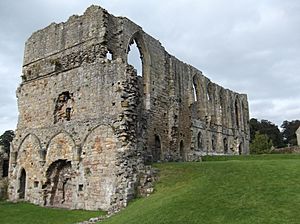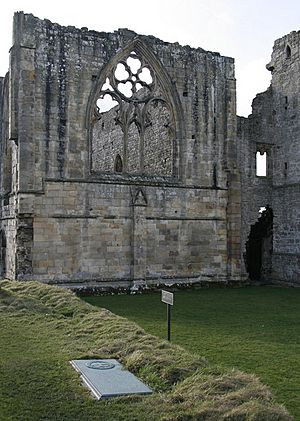Easby Abbey facts for kids
Quick facts for kids Easby Abbey |
|
|---|---|
| Abbey of St Agatha | |

Easby Abbey refectory
|
|
| 54°23′52″N 1°43′01″W / 54.39778°N 1.71694°W | |
| Location | Richmond, North Yorkshire |
| Country | England |
| Denomination | Premonstratensian |
| History | |
| Status | Ruin |
| Founded | 1152 |
| Founder(s) | Roald, Constable of Richmond Castle |
| Dedication | St Agatha |
| Specifications | |
| Materials | Stone |
Easby Abbey, also known as the Abbey of St Agatha, is a beautiful ruined abbey. It sits on the eastern bank of the River Swale, near Richmond in North Yorkshire, England. Even though it's privately owned, English Heritage helps take care of it. You can reach it by walking along the river from Richmond Castle. There's also a church nearby with old paintings from the 1200s that is still used today.
Contents
History of Easby Abbey
The Abbey of St Agatha at Easby was started in 1152. A man named Roald, who was in charge of Richmond Castle, founded it. The people who lived here were called canons, not monks. They belonged to a special group called the Premonstratensian order. These canons wore white clothes, so they were often called the White Canons. Easby was connected to another Premonstratensian abbey in Lincolnshire. It was the third abbey of this kind built in England.
The White Canons lived a very strict and simple life, similar to the Cistercian monks. Unlike other monks, they were free from control by bishops. They spent their time preaching and helping people in the area. This included giving out food and drinks to those in need. The canons also raised sheep to support themselves.
Other old Premonstratensian abbeys in northern England include Egglestone Abbey in County Durham and Shap Abbey in Cumbria. Like many monasteries in the north, Easby often suffered from attacks by Scottish armies during the Middle Ages. In 1346, Easby and Egglestone Abbey were badly damaged. This happened when the English army stayed there on their way to the Battle of Neville's Cross.
In the late 1530s, King Henry VIII decided to close down many monasteries in England. This event is known as the Dissolution of the Monasteries. Easby Abbey was abandoned and slowly fell into ruins. However, some of its best parts were saved. For example, the beautiful wooden seats from the abbey's choir are now in the Richmond parish church.
Today, the ruins of Easby Abbey are protected as a Grade I listed building. This means they are very important historical structures.
St Agatha's Church (Easby Church)
St Agatha's Church is part of the local Anglican church group. This group includes churches in Easby, Skeeby, Brompton on Swale, and Bolton on Swale. It belongs to the Diocese of Leeds.
St Agatha's Church, also called Easby Church, is located outside of Richmond, Yorkshire. You can easily get there from Richmond by following a path along the river. We don't know the exact year Easby Church was built, but people think it was there even before the abbey next to it. Not much of the original church building remains today.
What is special about St Agatha's are its medieval frescoes. These are old wall paintings that were saved during the Reformation. They were preserved because they were covered with whitewash, which protected them. Both the church and the abbey are open to the public for free.
Inside Easby Church, you can see a copy of the carved stone Easby Cross. The real cross was made in the late 700s or early 800s. It is now kept at the Victoria and Albert Museum. It's amazing that this very old Christian cross survived! When the church was being fixed up, the cross was broken into pieces and used as building stones in the new church walls. It stayed hidden there until it was found and put back together in the 1900s.
The church is also a Grade I listed building, just like the abbey.
Burials at Easby Abbey
Many important people were buried at Easby Abbey over the centuries. These included members of the powerful Scrope family, who were well-known soldiers and noblemen. Some of them were:
- Henry le Scrope
- William le Scrope (Henry's son), a brave soldier in wars against France and Scotland
- Richard le Scrope, 1st Baron Scrope of Bolton (buried in 1403)
- Roger Scrope, 2nd Baron Scrope of Bolton
- Richard Scrope, 3rd Baron Scrope of Bolton
- Henry Scrope, 4th Baron Scrope of Bolton
- John Scrope, 5th Baron Scrope of Bolton
See also
Images for kids









